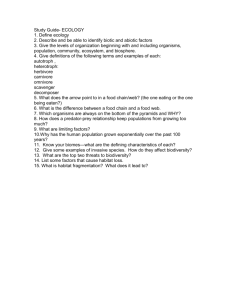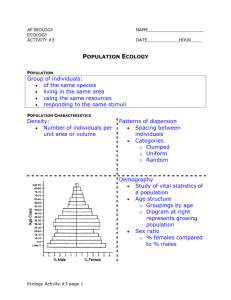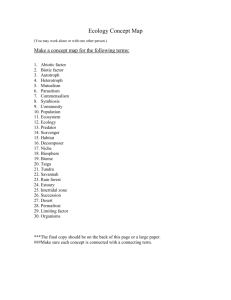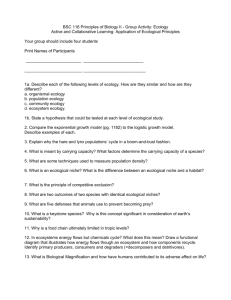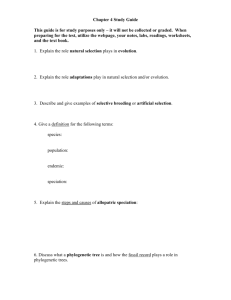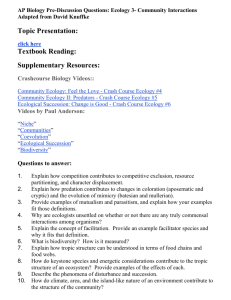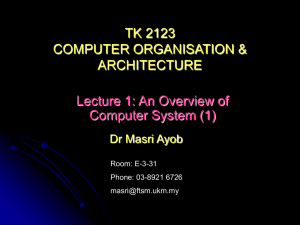Course Description
advertisement
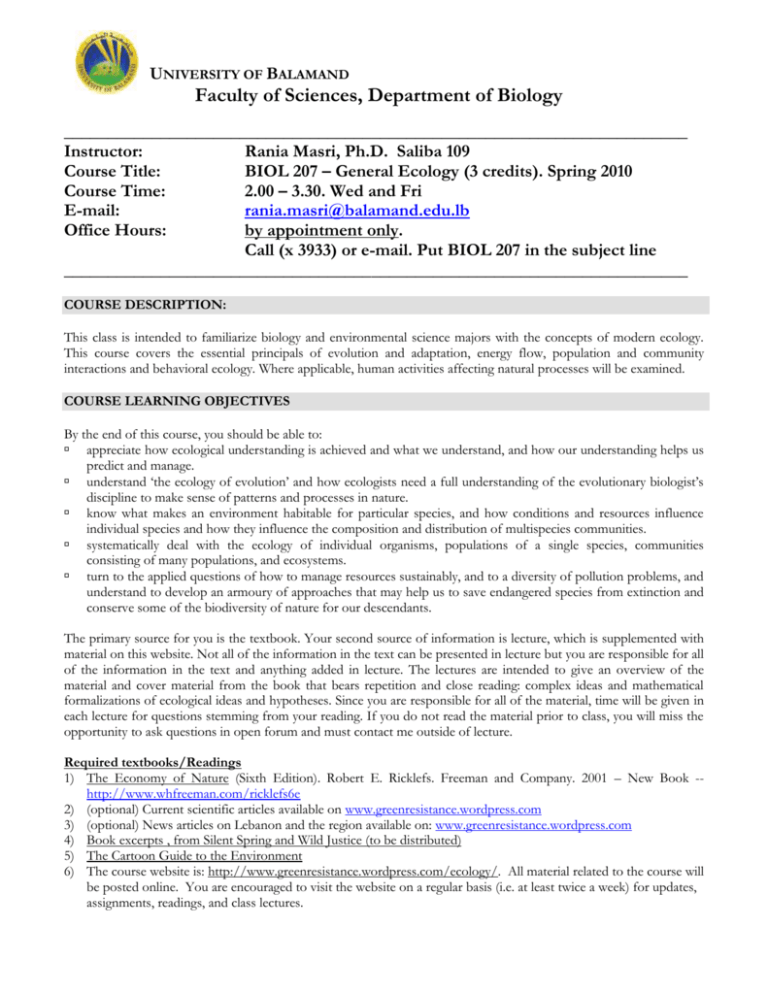
UNIVERSITY OF BALAMAND Faculty of Sciences, Department of Biology _______________________________________________________________________ Instructor: Rania Masri, Ph.D. Saliba 109 Course Title: BIOL 207 – General Ecology (3 credits). Spring 2010 Course Time: 2.00 – 3.30. Wed and Fri E-mail: rania.masri@balamand.edu.lb Office Hours: by appointment only. Call (x 3933) or e-mail. Put BIOL 207 in the subject line _______________________________________________________________________ COURSE DESCRIPTION: This class is intended to familiarize biology and environmental science majors with the concepts of modern ecology. This course covers the essential principals of evolution and adaptation, energy flow, population and community interactions and behavioral ecology. Where applicable, human activities affecting natural processes will be examined. COURSE LEARNING OBJECTIVES By the end of this course, you should be able to: appreciate how ecological understanding is achieved and what we understand, and how our understanding helps us predict and manage. understand ‘the ecology of evolution’ and how ecologists need a full understanding of the evolutionary biologist’s discipline to make sense of patterns and processes in nature. know what makes an environment habitable for particular species, and how conditions and resources influence individual species and how they influence the composition and distribution of multispecies communities. systematically deal with the ecology of individual organisms, populations of a single species, communities consisting of many populations, and ecosystems. turn to the applied questions of how to manage resources sustainably, and to a diversity of pollution problems, and understand to develop an armoury of approaches that may help us to save endangered species from extinction and conserve some of the biodiversity of nature for our descendants. The primary source for you is the textbook. Your second source of information is lecture, which is supplemented with material on this website. Not all of the information in the text can be presented in lecture but you are responsible for all of the information in the text and anything added in lecture. The lectures are intended to give an overview of the material and cover material from the book that bears repetition and close reading: complex ideas and mathematical formalizations of ecological ideas and hypotheses. Since you are responsible for all of the material, time will be given in each lecture for questions stemming from your reading. If you do not read the material prior to class, you will miss the opportunity to ask questions in open forum and must contact me outside of lecture. Required textbooks/Readings 1) The Economy of Nature (Sixth Edition). Robert E. Ricklefs. Freeman and Company. 2001 – New Book -http://www.whfreeman.com/ricklefs6e 2) (optional) Current scientific articles available on www.greenresistance.wordpress.com 3) (optional) News articles on Lebanon and the region available on: www.greenresistance.wordpress.com 4) Book excerpts , from Silent Spring and Wild Justice (to be distributed) 5) The Cartoon Guide to the Environment 6) The course website is: http://www.greenresistance.wordpress.com/ecology/. All material related to the course will be posted online. You are encouraged to visit the website on a regular basis (i.e. at least twice a week) for updates, assignments, readings, and class lectures. Organic Course Evaluation 2 exams: Comprehensive Final Exam: Online quizzes: Homework assignments: 22% each (44%) 34% 10% (http://www.whfreeman.com/ricklefs6e) 12% Extra Credit Options: (a) commenting on articles on website – up to 3 points added to your final grade; (b) book critique (from: http://www.shelfari.com/raniamasri - with my approval) - up to 5 points added to your final grade Note: There is no curve in this class. Student Reading / Cheat Sheet To encourage you to read the required textbook chapter (or additional reading material) before class, you are allowed to write notes and bring those notes to the exam. Here is the procedure. The day that a certain chapter is due, you may bring to class – at the start of the class – your own notes on the chapter in an 8 x 10 index card. Give me that card, and I will give that same card back to you during the exam. Student Exam Questions Two weeks before each exam, I will ask you to submit questions to me via email that could be used on the exam. The questions should have the same format as those on the practice quizzes (i.e., multiple choice with 4 options). You may also email essay questions. When you email questions to me please put "BIOL 207: questions for exam" in the subject line. For each question of yours that we use on the exam, you will receive 1 extra credit point. I will limit you to 2 extra points (questions) per exam, but it is in your best interest to submit several (8-10) questions. Also, writing questions is a very good way to study for exams. 2 ORGANIC TIME TABLE April 7 April 9 April 14 April 16 April 21 April 23 April 28 April 30 May 5 May 7 May 12 May 14 May 19 May 21 May 26 May 28 June 2 June 4 June 9 Chapter / Readings – Introduction Introduction / Life and the Physical Environment The Physical Environment Adaptation to Aquatic and Terrestrial Environments Variations in the Physical Environment The Biome Concept Evolution and Adaptation Need to schedule a make up session Life Histories and Evolutionary Fitness Distribution and Spatial Structure of Populations Population Growth and Regulation Exam 1 (Chapters 1 – 7, 10-11 – select) Need to schedule make up session Spatial Dynamics of Populations / Population Genetics Chapter 1 (pages 1-21) Chapter 1/ 2 Chapter 2 Chapter 3 Chapter 4 Chapter 5 Chapter 6 Chapter 7 Chapter 10 Chapter 11 Chapter 12 / 13 Species Interactions Dynamics of Consumer-Resource Interactions Competition Community Structure Ecological Succession Biodiversity Flexible day Exam 2 (Chapters 12/13, 14-20 – select) Energy in the Ecosystem Chapter 14 Chapter 15 Chapter 16 Chapter 18 Chapter 19 Chapter 20 Pathways of Elements in Ecosystems Chapter 23 / 24 (select) Landscape Ecology Biodiversity, Extinction, and Conservation Economic Development and Global Ecology Chapter 25 Chapter 26 Chapter 27 Lebanon and the Region flexible day TBA Chapter 22 June 11: Reading Period June 13 – June 19: Final Exams 3 March 19 March 24 March 26 March 31 Subject 3 Page Date February 17 February 19 February 24 February 26 March 3 March 5 March 10 March 12 March 17

